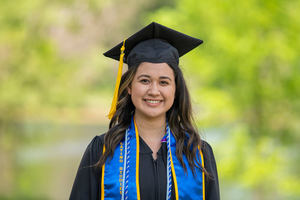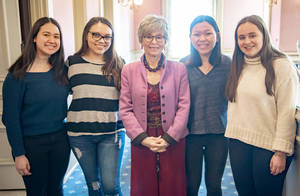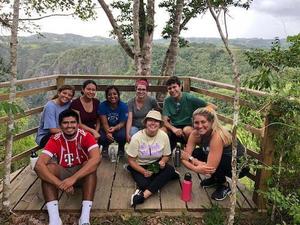Dressed as a bright orange carrot at the front of the grade school classroom, Alejandra Osorio would ask students to pick between her and their cupcake outfit-clad peer standing a few feet away.
Almost unanimously, the students would choose her sweeter counterpart as their preferred snack. The scene repeated itself in classroom after classroom, in virtually all the schools the then-high schooler visited in her hometown of Santa Ana, California. The tour, part of a public health project she initiated with support from the local city council, was eye-opening for the budding researcher.

Now a graduating senior in the College of Science, Alejandra repeats the lesson she would then make plain to her young audiences: children like them were more inclined to opt for the sweeter, more processed snack than they were the healthier, more natural option.
“My mom runs a daycare, so I would see the kids in our home daycare center,” says Alejandra, also known as ‘Ale’ to friends and family. “They would throw away vegetables, but take out gummies, skittles and candy to eat. Based on that, I went to the Santa Ana city council and told them what I found out about this and other health issues affecting the community.”
An accompanying poster board showing the loads of sugar in some snacks and beverages would drive home her point that additives hijacked their decision-making ability. But with the right information, students like them would be more likely to make the healthful choice, now and in the future.
Undoubtedly, it’s this passion for health and education that has led the Science Pre-professional major to build up an impressive resume these past four years at Notre Dame. For one, there’s her position with Dr. Abigail Weaver, of the Department of Civil & Environmental Engineering & Earth Sciences. Throughout her time on campus, she’s worked in Dr. Weaver’s lab investigating the bacteria that make up prosthetic joint infections.
“Ale's curiosity and attention to detail make her a good fit for carrying out research,” Weaver says. It “can be difficult when schedules are busy. Students like Ale make research a priority and this dedication pays off.”
Alejandra, a Balfour-Hesburgh scholar, has certainly found support from many sectors. But particularly important has been her relationship with the Institute for Latino Studies, where she is one of six members of the inaugural cohort of the Latino Studies Scholars Program.

Along with Diego Reynoso, she is one of two who were picked as sophomores following the recommendations of professors and financial support from alumni; usually scholars are selected as incoming freshmen. Merit scholars in LSSP receive $25,000 per year, in addition to summer internship or research dollars. “In my gap year after graduation, I won’t have to confront quite as much student loan debt due to the generosity of ND alumni who funded LSSP,” says Alejandra.
In total, there are eighteen merit scholars on campus, including a record six in the most recent class of 2024, each receiving a merit award for their demonstrated track record of leadership addressing issues critical to the future of Latinx communities in the United States.
Indeed, Alejandra’s consistency has continued to carry her through to a post-graduation post as full-time research assistant at UCLA’s Center for the Study of Latino Health and Culture.
Not only does she have a job on lock, she’s also secured a place at the University of California Irvine Medical School as a future student. Specifically, at their “PRIME” Academy, which is geared towards those prospective medical students focused on bringing about positive health outcomes for Latinx populations. The plan is to apply to medical school in 2022.

This summer, though, she’ll head off to Puebla, Mexico to work with the biology department at a local university on cancer research. At the same time, she’ll be collaborating with Una Nueva Esperanza, a nonprofit that provides support to young people undergoing treatment for cancer. These relationships are founded on a NDI study abroad experience two yeas ago.
Besides her Science Pre-professional major, Alejandra minored in Latino Studies and in Anthropology. She was inspired to go for the former after picking up a flier while cleaning out old cabinets at the former ILS office in McKenna Hall, where she worked part-time. The ad explained that a Latino Studies supplementary major or minor fit in with the Pre-med track for those interested in culturally-specific practices. That made sense to the aspiring bilingual physician and public health leader.
“Being Latina myself, I have and continue to go through all the barriers society has placed on us," She says. "Being at Notre Dame, I have gained so much confidence and knowledge that I did not have before and I want to share this knowledge with the Latinx community.”
Through a Community-Based Learning course, she began volunteering at the local South Bend-based La Casa de Amistad, tutoring children and teenagers her sophomore year. She also teamed up with another merit scholar to develop a research proposal on water quality in San Juan, Puerto Rico.
As part of ILS’s Cross-Cultural Leadership Program, she prepared the microbial research proposal for the Caño Martin Peña, an inner city canal lined by low income households. Moreover, during the pandemic shut-down she managed to complete a virtual internship at the League of United Latin American Citizens. There, she learned to design outreach programs to Latinx communities to address COVID-19 and HIV prevention.
This past semester she’s been very enthusiastic about her Transformative Latino Leadership Seminar with ILS Director and Endowed Professor of Political Science, Dr. Luis Ricardo Fraga. The course has been the perfect capstone to her academic career at Notre Dame, as she put down on paper her 20-year plan for leading health initiatives in Southern California.
“Alejandra is passionate and focused about living out her career as a medical professional who is accessible and engaged in the community she grew up in," Fraga says of the graduating senior. "I am confident Alejandra is going to achieve both her career goals and her community leadership dreams.”
Adds Alejandra: “We write strategic plans, putting ourselves in the leadership position, by explaining how we will be transformative leaders for the Latinx community. I really want to make structural changes that confront societal barriers to wellness.”
Originally published by at latinostudies.nd.edu on May 21, 2021.